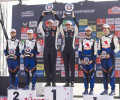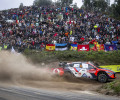WRC27 Technical Regulations confirm a dynamic, flexible future for FIA World Rally Championship
- Bodywork open to huge variety of production shapes and bespoke designs
- More than 50 per cent reduction in cost compared to current generation
- Open for teams and tuners to homologate a car
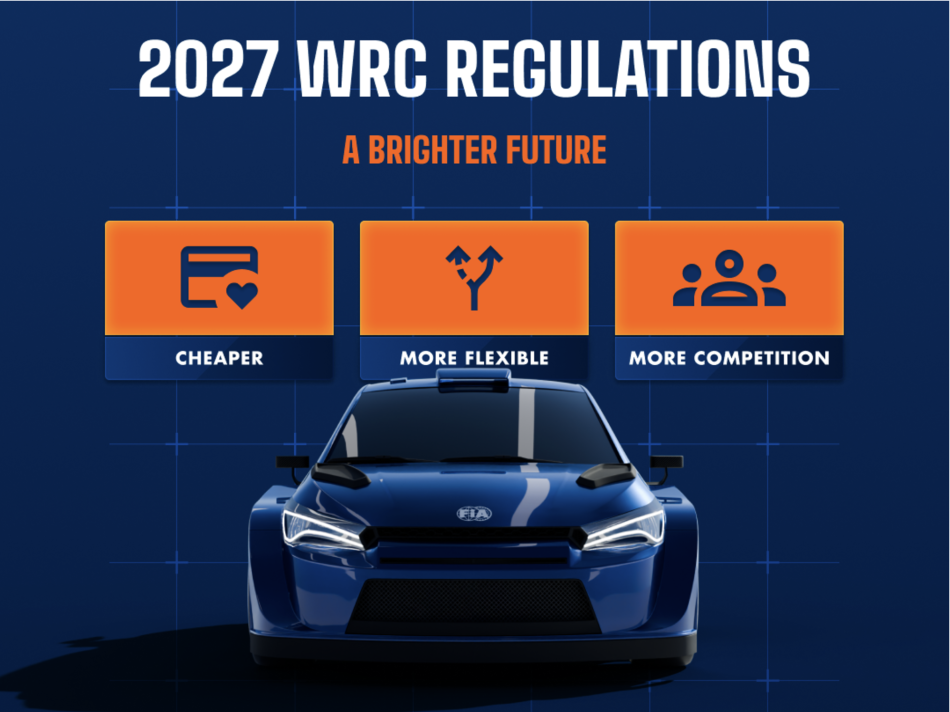
The World Motor Sport Council has today approved the Technical Regulations that will ensure a dynamic, flexible future for the FIA World Rally Championship.
After extensive consultation and collaboration between the WRC stakeholders, today’s confirmation of the rules, referred to as WRC27, have been proposed and agreed by the WRC Commission, which comprises voting members from all current manufacturers, the WRC Promoter and a representative of the crews. The rules will come into effect from the 2027 season.
The planned regulations cycle will last for ten years, ensuring a stable platform for manufacturers and teams to invest and grow the sport.
Style and substance
Flexibility is central to the technical future of the WRC. With the automotive industry more diverse and dynamic than ever, the safety cell concept from the current generation Rally1 cars has been refined into a common design that will reduce complexity and cost.
This then allows bodywork from almost any scaled production car to be fitted to the safety cell, meaning that hatchbacks could conceivably compete against saloons, SUVs, and there’s even the possibility for bespoke rally concept designs to take to the stages from 2027.
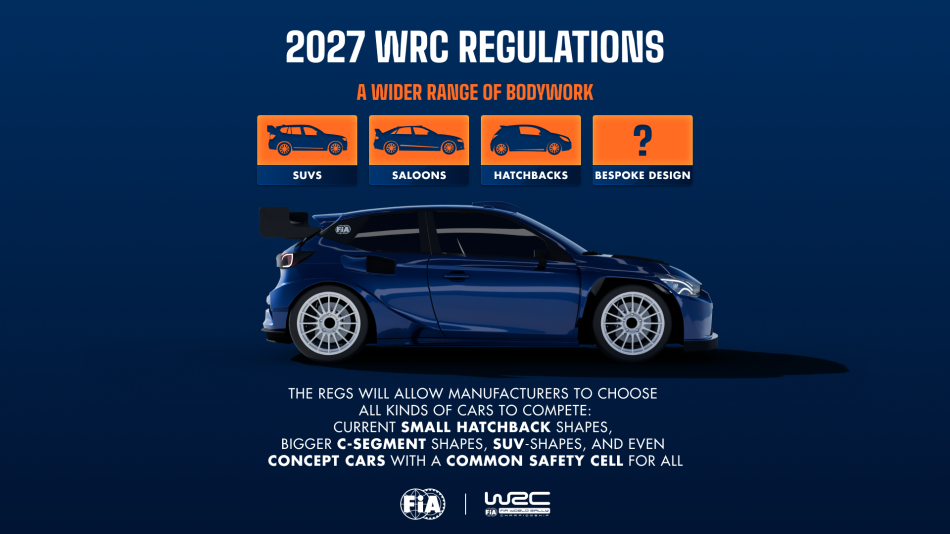
Built-in cost saving
Cost control has been identified by WRC stakeholders as one of the key limiting factors on participation in the top level of the category, and therefore the 2027 costs will be capped at €345k. This represents more than a 50 per cent reduction in costs when compared to the outgoing formula.
These cost savings will be achieved though component cost specifications rather than financial regulations. There will also be savings in the technical designs of certain components that will make them more durable over the course of a rally.
In addition to reducing the cost of the cars themselves, running costs for teams are set to be reduced by limiting personnel, reducing logistics transport costs, increasing the use of local facilities and increasing data connectivity to aid offsite engineering.

Powertrains of the future
The regulations confirmed today not only provide for variety of bodywork, but also of powertrains. The World Rally Championship was one of the pioneers of sustainably-fuelled motor sport, mandating its use in 2022, and with the 2027 regulations, there is built-in freedom between sustainably-fuelled internal combustion engines, hybrid powertrains or fully-electric solutions. The initial target is for competitors to utilise sustainably-fuelled ICE in 2027, with diversification including hybrid systems, or fully electric technologies, that could be introduced at a later stage.
This is a reflection of the current automotive landscape, with a plethora of different configurations catering for different situations in different markets. By remaining open to all of these options while holding environmental sustainability at its core, the WRC will continue to be a trailblazer for technology.
Off-road companions
The regulations approved by the World Motor Sport Council lay the groundwork for the potential for cross-over between the FIA World Rally Championship and the FIA World Rallycross Championship.
While it would still require further approvals and updates, the rules set the stage for a manufacturer or a team to run concurrent programmes, potentially with different powertrains catering for the specific needs of each championship.
In combination with a boost to grassroots off-road competition through the FIA Affordable Cross Car initiative, the regulations coming into effect from the 2027 season onwards are set to secure a dynamic future for rally competition, making it more exciting, accessible and safe.
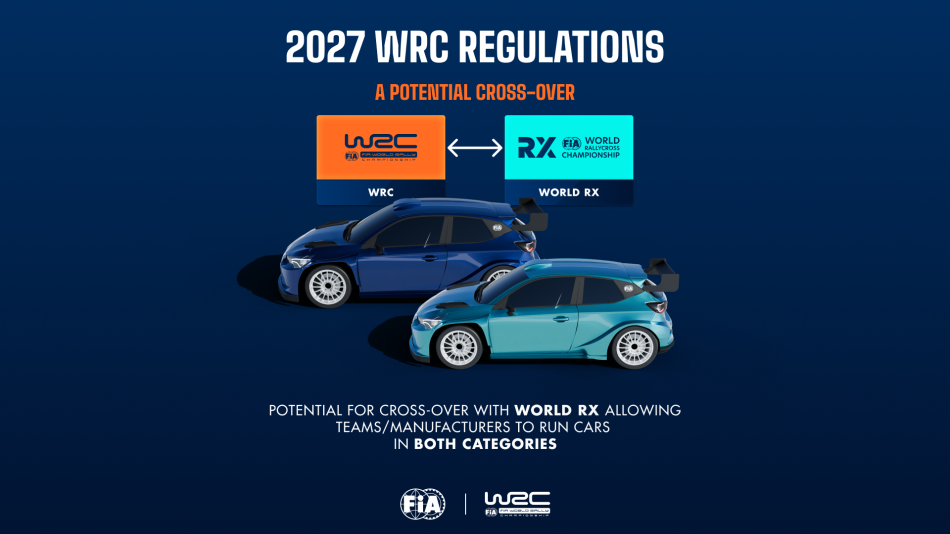
FIA President Mohammed Ben Sulayem said: “The regulations that we have approved today are critical to the long-term growth of the FIA World Rally Championship. They lay the foundations for an exciting future with a focus on cost containment, sustainability and growing participation at the top level of rallying.”
FIA President of the WRC Commission, Pernilla Solberg, said: “I would like to thank all the Commission members and the WRC Technical Working Group for the significant amount of work that has got us to this stage. We set some clear objectives based on what the competitors, organisers and fans were telling us, and this has resulted in a set of regulations that will massively reduce costs and allow independent teams to compete with manufacturers, while giving the WRC the flexibility to remain relevant regardless of the shifting automotive landscape. We still have some work to do, but I’m really excited for this future.”
Peter Thul, WRC Promoter Director of Sport, said: “Working with FIA and other stakeholders, WRC Promoter has been an active contributor in the process which was leading to these new technical regulations for 2027. The significant cost reduction is an important step to keep the current manufacturers in the championship and to encourage new manufacturers and brands to join the WRC. We thank all those involved from the FIA WRC Technical Working Group and believe that there is now a clear vision for the future.”
Cyril Abiteboul, President and Team Principal Hyundai Motorsport: "It is always positive for manufacturers to have a long-term roadmap for the championships that we can assess and improve altogether. We welcome the important efforts that have been made to reduce costs, as the sport needs to stabilize and develop its manufacturers base. We also look forward to developing the value of the sport by showcasing spectacular cars in exciting rally formats to increase the fanbase.
Malcolm Wilson, Managing Director M-Sport Ford WRT: “I think that the regulations approved to day are the correct way to go for the WRC. We need to have new entries, more teams and drivers competing at the top level, and these regulations for 2027 will encourage this. It will allow us to give more young drivers a chance, which is essential for the long-term success of the sport, and it's also really important that we make the WRC more affordable, allowing teams to compete alongside manufacturers.”
Jari-Matti Latvala, Team Principal Toyota GAZOO Racing WRT: “We have been working hard with the FIA to contribute as much as we can towards the 2027 regulations. We believe the main headlines of draft regulations are well formulated and heading in the correct direction. We still believe there is important work to do in order to finalise and improve some of the details but at this stage that is totally normal.”

 Facebook
Facebook Twitter
Twitter